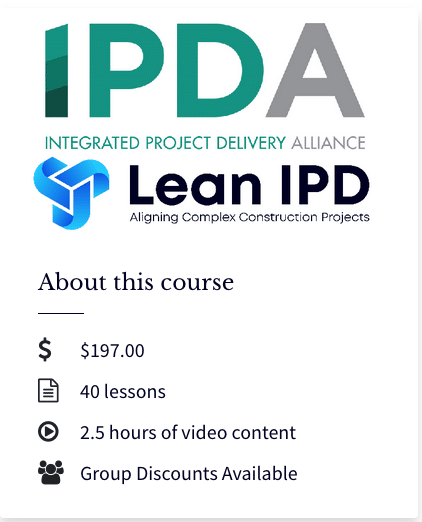Whether you are new to Lean IPD, are a seasoned practitioner who is regularly onboarding new members to large project teams, or simply want a refresher course to stay up-to-date with the lean principles, the new course Introduction to IPD is for you!
After the success of IPD - An Action Guide for Leaders, LeanIPD has joined forces with IPDA (Integrated Project Delivery Alliance) to put together a course composed of narrated video modules that track the format of the guide.
Special offer for teams
We created this course with companies and IPD teams in mind and offer group discounts for teams who want to take the course together. If you have a large IPD project onboarding people every month, consider using this course as the first step in your onboarding process prior to onsite, in-person training.
What you will get
The course covers when you should consider IPD (and when you should not), how to validate projects, set up financials and negotiate the deal, target value design and what to do when something inevitably goes wrong. You will get about 2.5 hours of content, composed of over 20 individual video modules plus an introduction, assessments, and completion modules (40 sessions in total). You can start and stop anytime. With the completion of the course and passing an assessment, you will receive a Certificate of Completion from IPDA and Lean IPD.

Why everyone wins with Lean IPD
I've tried just about every delivery model there is for construction projects in healthcare. While it is possible to deliver successful projects with any model, some are more reliable than others.
Awarding work to lump sum bidders based on who has the lowest price often sets the owner, designers and builders against each other. Each firm contractually has to protect itself from doing work and not getting paid for it.
CM @ Risk with early onboarding of trade partners and a negotiated guaranteed maximum price allows a team to work with the design partners and the owner to better scope and coordinate a project before committing to a final number.
Job order costing allows a team to price a project based on quantities and a set price book that is pre-negotiated. This works well for simple projects where quantities are easy to define. As projects get larger and more complex, requiring more coordination prior to construction, the model becomes cumbersome and opens parties up to the risk of incorrectly calculating quantities.
Design/Build can allow an owner to transfer the project to a single entity. This works best when the owner knows clearly what they want and doesn't make changes during the design and/or construction process. Newer models allow for additional collaboration in design yet they still break down in construction.
In Healthcare, change is the only constant
Every new hospital I've delivered had renovation projects underway before we opened the building. Yes, we were remodeling the building before we even opened it.
Integrated Project Delivery is the only model I've seen that transparently links design and construction partners with the owner in a shared risk/reward model. This means that when the project goes well, everyone makes more money. When the project doesn't go well, the entire team is affected regardless of fault. In practice, this pulls the team closer together when things go wrong (which they always do), instead of pushing them apart.
With the open-book nature of the contract, changes can be implemented quickly and fairly, with the owner paying for the costs of changes and no one overcharging or working for free.
If you are interested in learning more about Integrated Project Delivery as a delivery model, this new Introduction to Integrated Project Delivery Course is for you.
For group discounts, contact info@leanipd.com
Feature image: Oli Dale via Unsplash
Further reading
What is Integrated Project Delivery?
More lean resources
IPD course bundle
James is an expert in the set-up and structure of large, complex capital projects using Lean and Integrated Project Delivery to drive highly reliable results.
He has negotiated IPD contracts and delivered over $650M in complex healthcare projects as an Owner's Representative with multiparty contracts, aligned team incentives and collaborative delivery models.




